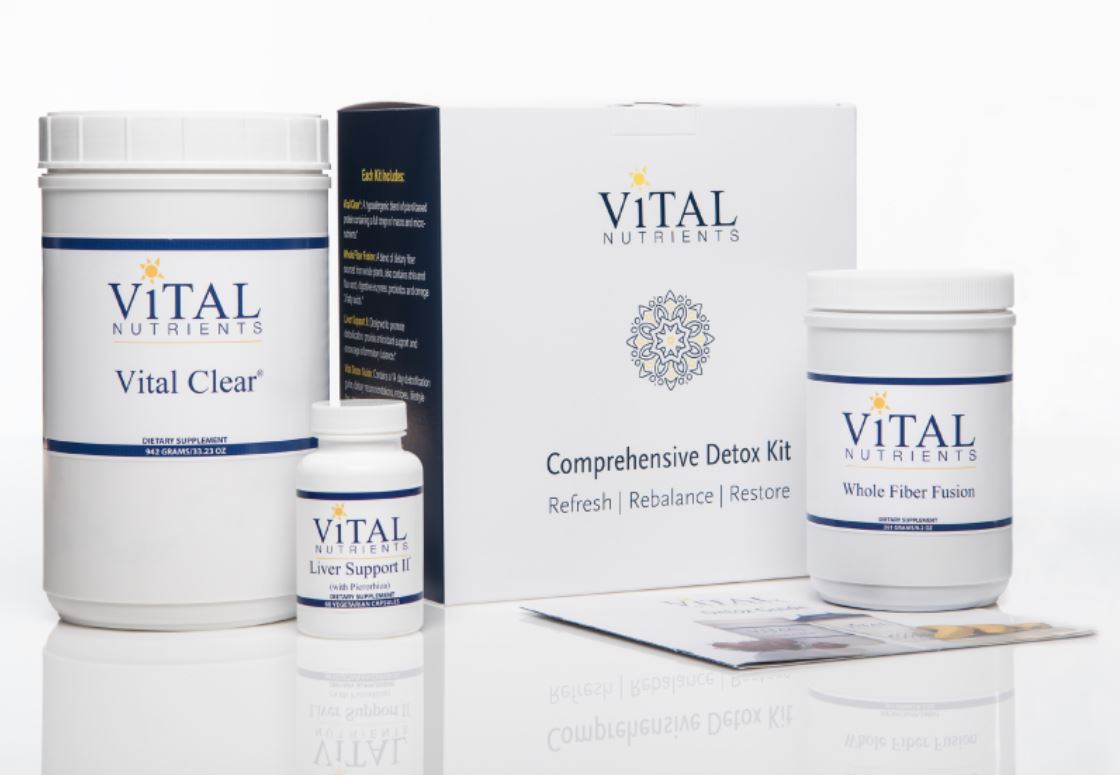Have PCOS and Weight Issues? A Detox May Help
As with almost everyone, it's probable that women with PCOS carry some body burden of environmental chemicals, toxic metals, cigarette smoke, drugs, advanced glycation byproducts, and other unhealthy substances.
The effect of this burden is pernicious because it's not easy to identify a specific substance as the cause of your PCOS symptoms.
Free PCOS Newsletter
Exposure comes from everywhere -- the air, water, food, beverages, and all kinds of consumer, personal, household, industrial and medical products. They are prevalent throughout your household and where you work. They are inside your body and on your skin.
Environmental chemicals and toxic metals cause a wide range of problems including increased weight and impairment function of ovaries, thyroid, liver, kidneys, adrenals, brain and all other organs. They can interfere with fertility and may help to cause PCOS in your future unborn daughter.
As an example of a common chemical, it's known that those with PCOS have higher levels of an environmental chemical called BPA as compared to other women. BPA is an estrogenic hormone disrupter found in many consumer products that can mess up your hormone balance and lead to the symptoms you're experiencing.
And there are at least 80,000 other chemicals and compounds everywhere in our environment that are likely unhealthy or toxic. We can't see, taste or smell most of them, so we're mostly unaware of this huge problem.
Unfortunately, only a tiny percentage of these compounds have been tested for their adverse health effects. So the true scope of the threat is seriously underestimated.
Environmental Toxins Can Make You Fat
To get a better grasp of this issue, consider one of the main concerns of PCOS: Being overweight or obese.
Could environmental compounds be partly responsible for your difficulty in losing weight?
Medical research has shown that various chemicals in your environment will make you gain weight. These compounds are referred to as "obesogens".
Here are some of the bad things obesogens can do to your weight.
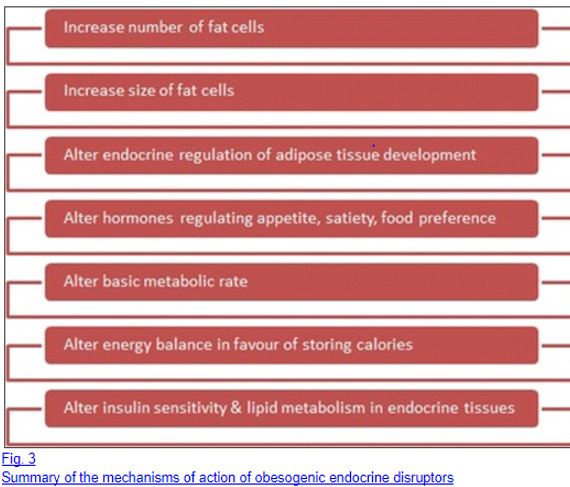
The problem is that many obesogens are stored in your fat cells. They increase fat deposition in your body, which increases the number and size of fat cells, which creates additional storage sites for the obesogens.
So you end up with a vicious cycle of more fat -- more obesogens -- even more fat -- and even more obesogens, as shown below.
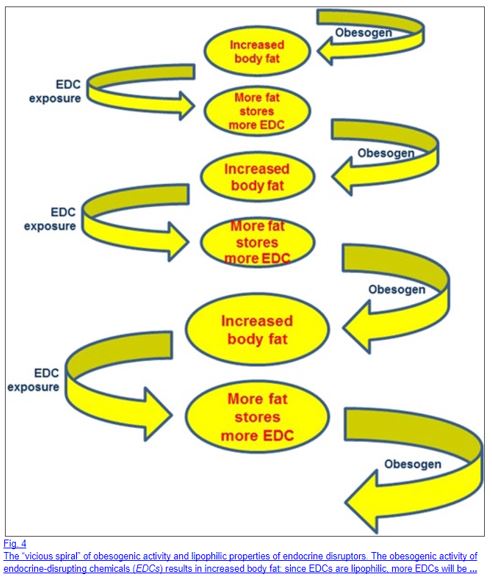
Obesogens Are Everywhere
OK, now that you can see the problem, where are you going to find these obesogens? Well, they omnipresent in your environment, as shown below.
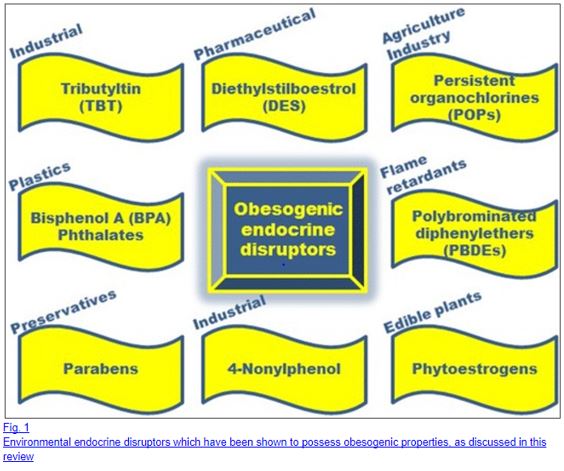
How Do You Reduce Your Risk?
The first thing you can do is find ways to minimize your exposure to all unnatural, man-made environmental compounds. You could switch to organic foods. Don't live near freeways or major highways. Carefully examine the labels of all food products. Try to avoid processed foods and beverages containing chemicals of any kind. Ditto for all household and consumer products you bring into your home or put on your skin. If you buy new furniture, put in a new carpet, remodel your home, or bring dry cleaning into your home, make sure there is plenty of ventilation to carry away volatile chemicals.
The second thing you can do is try to remove chemicals that are already stored in your body and making your fat as well as disrupting the function of your organs and brain.
This is easier said than done.
You could go to an environmental medicine clinic and undergo a comprehensive detox program. Therapies could include such things as saunas, colonics, chelation therapy, nutritional supplementation, special diets and a lot more.
The main problem with this type of clinic is that they are few and far between, and they are quite expensive. Health insurance coverage is likely to be minimal.
So is there anything else you could do?
Support Your Liver and Help Control PCOS!
A complication for PCOS is widespread incidence of non-alcoholic fatty liver disease or NAFLD. This disorder is characterized by the inappropriate storage of fat into the liver, thus reducing its ability to function properly and increasing inflammation in the liver.
Fatty liver degeneration is another issue is that most doctors don't pay attention to. Let's keep in mind that your liver is the main detoxification organ in your body. So if your liver isn't functioning very well, you're not detoxifying environmental chemicals as well as you should.
If you're going to better manage the removal of unhealthy substances from your body, you need to optimize liver function.
How to Improve Liver Function
Aside from cleaning up your diet and your environment, what might you do to help out your liver?
Well, you could do your own detox support program, as shown below.
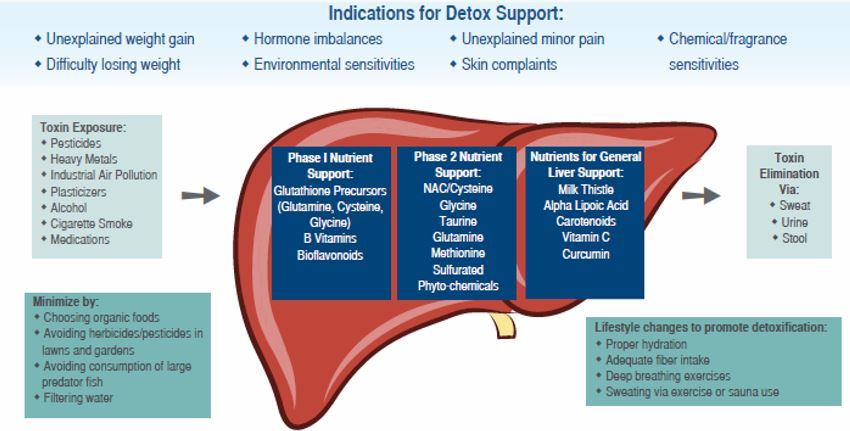
If you would like a structured "program" to assist you in your detox efforts, I can suggest the Comprehensive Detox Kit, manufactured by Vital Nutrients. It is a vegan, hypoallergenic 14-day cleanse that combines plant-based protein with two types of dietary fiber, a full range of macro and micro nutrients, as well as liver supportive botanicals and antioxidants.
The program also includes an eating plan, recipes, sample daily menus, and lifestyle tips for during and after the detox.
Sources:
Rutkowska AZ et al. Polycystic ovary syndrome and environmental toxins. Fertil Steril. 2016 Sep 15;106(4):948-58.
Zhou W et al. Bisphenol A and Ovarian Reserve among Infertile Women with Polycystic Ovarian Syndrome. Int J Environ Res Public Health. 2016 Dec 27;14(1).
Darbre PD. Endocrine Disruptors and Obesity. Curr Obes Rep. 2017; 6(1): 18–27.
Wheeler JR et al. Are all chemicals endocrine disruptors? Integr Environ Assess Manag. 2016 Apr; 12(2): 402–403.
Palioura E et al. Polycystic ovary syndrome (PCOS) and endocrine disrupting chemicals (EDCs). Rev Endocr Metab Disord. 2015 Dec;16(4):365-71.
Get Answers to your Questions about
- Fertility
- Weight Control
- Hair Loss
- Stress
- Unwanted Hair
- Acne...and more!
FREE PCOS Report
and Newsletter

Your email is safe with us. We respect your privacy, and you may unsubscribe at any time.
Recent Articles
-
PCOS Long Journey to The Happy End
Apr 30, 18 07:24 PM
Hi Girls, Maybe my story will have one day a good end but I am not there yet. Until I was 31 years old I lived my dream, having lovely husband, good -
PCOS and Miscarriage
Apr 17, 18 04:03 PM
Proper diet and natural supplements can help the body maintain a pregnancy through successful delivery.
-
How to Deal with PCOS and Stress
Apr 04, 18 04:19 PM
Your body has a natural capacity to heal itself if you provide it with the necessary tools.
